- Home
- ILIL ARBEL
The Lemon Tree Page 3
The Lemon Tree Read online
Page 3
“Praying? I didn't know Papa ever prayed.”
For a moment Mama hesitated. Then the old habit of openness and honesty won. “Well, before Sasha died, I used to believe in God, though I wasn't traditionally religious, and Papa didn't believe in Him. After Sasha died, I stopped believing in God, because how could a merciful God take my son away from me? But at that moment, Papa started to believe in God.”
“Why?” asked Feera, obviously bewildered, and dropping her arms with disastrous results to the wool skein. “Why did Sasha's death make him believe?”
“I think because he couldn't bear the thought that Sasha is alone, Feera. He had to feel that someone is looking after a little ten-years old boy . . .” Absent-mindedly, Mama took the dropped wool and started picking at it, trying to salvage the knotted mess.
“So is there a God or isn't there?” I asked, thoroughly confused.
Mama thought for a long time, slowly untangling the wool.
“You have to make up your own mind, darling. On that question, even a child must decide for herself,” she finally said.
“I can't believe in Him just at this moment,” said Feera. “I'm too angry with Him.”
“I don't know,” I said, considering. “Won't it hurt God's feelings if you stop believing in Him?”
“Hurt God's feelings?” Mama asked, startled by the idea.
“Yes, you see, maybe He couldn't help Sasha's death and He feels sad about it too . . .”
“I always thought He could do anything He wanted,” said Feera.
“Who knows,” said Mama, throwing the wool into her basket with unusual violence and turning to look at the lemon tree. “Maybe God has feelings, maybe He has reasons, if He exists. I would like to believe that since it would be a comfort, but I don't know. What a mess.”
I never knew whether she meant that life was a mess or that the wool was beyond repair. Papa came into the dining room and we had our tea, and spoke of other things.
***
Mama sewed a wide belt and put paper money into it. She intended to wear this belt under her clothes. Papa kept raw gold in a small bag around his neck, peasant-style. Mama sewed padded buttons to their coats, and put a gold coin in each button. The night before the trip they baked small rolls all night, and into each roll they inserted two gold coins. They put no forbidden objects on Feera and me. The two of us wandered desolately around the dark, half-empty house, holding hands. If Sasha were there with us, it would have been such an exciting adventure; we would have played such wonderful games. Palma would have been alive, too, and I knew Sasha would have found a way to take her to Israel. Mama could have sewn a little warm coat for her, just like the covering she sewed for the lemon tree. I hoped that somehow Sasha and Palma were together, and that he knew that we planned to take the lemon tree with us. How I missed my big brother, his imagination, exuberance, and joy in life.
I don't remember too much pain in separating from our home. Distant Israel beckoned like a warm, welcoming refuge full of sunshine. We never put it into words until much later, but Russia was no longer our homeland; we became outsiders. Siberia, that magical winter country filled with glowing icicles and stars, betrayed us and turned into a barren wasteland that took Sasha away.
And so equipped with food, clothes, and the lemon tree safely held in Mama's hands, we set out on the road.
CHAPTER FIVE: THE TRAIN
“So how many do you have?” asked Feera in a business-like manner, licking her pencil. “Seven!” I said triumphantly. “Two more than yours!”
“Stop bragging. Yesterday I had nine and you had only six,” said Feera. “So tell me your guess for tomorrow, anyway.”
Every morning, when Mama, tears in her eyes, tried to shake the lice from our dresses and comb them out of our hair, we competed as to who had more. Feera, who already knew how to write, kept the accounts in her little notebook as to how many lice we had each day, and the projected numbers for the next day.
In each station we searched for water, and filled two jars to last until the next stop, enough for drinking and cooking only. We could not bathe or clean the compartment, and the dirt in the trains was unbearable, so lice thrived everywhere – on the walls, the floor, and in the straw mattresses. The danger of typhoid fever that was carried by lice hovered over us all the time, and no cure for this disease even existed in those days.
But only our parents felt the hardships of the road. I enjoyed myself. The whole family in a miniature room on wheels, meals on the bunks, new people each station – all this fired my imagination and my games became increasingly fantastic, aided by the lack of toys and the limited space and movement for so many months.
And in these miserable surroundings I built my own world. For example, I imagined that a little girl called Hulda lived in one of the corners in the ceiling. Where did I get this name, I don't understand to this day; I never heard even a hint of such a person. One of the wonders of my life occurred when I came to Israel and found out that a settlement called Hulda actually existed.
Every morning, when I woke up to the gray, revolting ugliness of the compartment, I looked at the ceiling corner and said good morning to Hulda. She lived in a tiny house with a red roof, surrounded by a green garden; a beautiful, extremely clean girl, and my best friend. I spent hours upon hours in the corner, talking and playing with Hulda. I still believe that it is possible to find beauty anywhere, if only we know how to properly search for it.
***
We never changed trains. When needed, the locomotive was changed. At one station, when the train stopped, we saw through the carriage door a kiosk where sweets and newspapers were sold.
“Let's go get some chocolate,” suggested Feera. “These things look good.”
“Yes, and I want to stroll around a bit,” I said. “I feel like walking on real ground.”
“Yes, go,” said Mama. “Here is some money, but don't remain there for too long. Stay near the train if you take a walk. I don't want to lose sight of you.”
Experienced travelers by now, we knew we had plenty of time until the whistle would announce the need to board again. We took our time choosing the sweets, bought whatever we could, and turned around. The train vanished.
I heard the blood pounding in my ears, roaring like thunder, and my chest hurt as if my heart threatened to burst. The station around me shifted in gray, then black waves that engulfed me with dizziness. Helplessly, I looked at Feera. She was pointing at something, unable to talk. At a distance, I saw the last carriage of our train moving far away from us. In unison, we grasped each other's hand and leapt from the platform into the train tracks. Hand in hand, screaming, we chased the departing train, surrounded by other trains moving on interweaving tracks. The loud whistling of these trains silenced our screams. I cannot say how we escaped being run over, nor do I know how long we stayed on the tracks. The nightmarish moments seemed to last a lifetime.
Suddenly, at a great distance, we saw Mama's head poking from the door of our compartment. She was desperately signing to us with her hands to climb on the platform. Somehow we understood. Somehow we obeyed. Leaping in front of an oncoming train, we grabbed the platform and climbed on it, then collapsed on the ground and watched our train returning. It simply changed tracks.
Many, many years passed since that day, and I still dream about a train that is moving away from me and inside it is my entire world.
***
For a while, the journey went on uneventfully. One night, the itching of the lice bites woke me up. I noticed that the train was not moving, but that happened often. Trying to rearrange the blanket so as to better cover the straw, I heard Papa's voice. It held both determination and apprehension.
Papa stood by the wide-open carriage door and talked into the night: “Hadassa, I am going to throw away the gold from around my neck.”
I understood. The searches must have begun. I loved those chunks of gold. I still planned to wear the piece that Ivan Petrovich gave me to bal
ls and parties, looking like a real princess. In whispers, I begged for mercy on the gold. “Papa, what will it do all alone in the dark, on the road between Siberia and China?”
“If they find the gold on my neck, Ida, we will all be arrested.”
I didn't know, and he couldn't bring himself to tell me, that the guards did not bother to arrest anyone; they simply brought you to an open field and shot you in the back. He was a good, dear father, entirely devoted to his children, and couldn't bear my disappointment, either. For a second he stood, torn apart by indecision, and then hid one lonely piece in the straw of his mattress and threw the rest into the darkness. Five minutes later two guards entered our carriage. I hid my face to avoid seeing their uniforms and guns. They searched the compartment and told Mama and Papa to turn out their pockets, but didn't bother too much with the mattresses and didn't touch Feera and me. I trembled on my bunk, not even scratching the lice bites, pretending to be asleep. Feera apparently did the same. After an eternity the guards left. They had found nothing.
CHAPTER SIX: ESCAPE
Finally we reached the Manchurian border, the most dangerous point for all refugees planning to leave Russia. The border police in Manchuria performed meticulous searches, followed by severe punishments, particularly for Jewish refugees.
When we descended from the compartment we had occupied for such a long time, I felt I was leaving home. With tears in my eyes I parted from the little imaginary house in the corner of the ceiling and promised Hulda that I would try to find her on another ceiling as soon as I could.
Snow and frost covered the ground, a white, dreary world capped with gray sky. We entered an immense waiting hall, unbearably cold, where hundreds of refugees huddled on the floor with their possessions. All had the same wide-open, scared, tired eyes. Many children cried, but the tension was so great that few adults found ways to relax their children. They just waited, trying not to attract the guards' attention. We quietly joined the throng. Papa sat next to us on the floor; Mama, pale and silent, remained standing, holding the lemon tree tightly.
I looked at the ceiling, halfheartedly hoping to find Hulda and her garden, but the ceiling was very high, dark, and covered with cobwebs. I didn't think Hulda could stand it there. I felt as if darkness invaded my heart as well, the fear paralyzing my imagination.
Then another unbearable thing happened. A policeman motioned Papa to follow him to the men’s department. Papa looked back at us, his blue eyes full of pain. “It's all right, girls,” said Mama quietly. “You will follow me to the women's department, and soon we will meet Papa in the hall again. Don't worry.” At that moment, however, I wasn't worrying about myself, but about Papa. I couldn't bear the thought that he was alone; at least the three of us were together. If only Sasha were here to be with him, I thought, it's so unfair, so unfair, poor Papa, all alone . . . “Don't cry, Ida,” said Mama firmly and put her arm around me. “You will attract attention.” Somehow I managed. Mama's immeasurable inner strength never failed me.
We were received by a very tall woman, dressed entirely in black. She even wore a black fur hat, like the hats of the Cossacks. Over her forehead peeked a few gray hairs and her face was wrinkled, not with friendly laugh lines around the eyes, but with vicious lines, pointing down around her mouth. She smelled of mildew, and reminded me of Baba Yaga, the horrible witch that ate little children in the Russian fairy tales.
This looming apparition went straight to Feera and mumbled: “undo your braids and then take off your clothes.” Feera stood naked and shivering from the cold, with only her loose hair reaching her ankles and covering her back. The witch raised her eyebrows with surprise at the magnificent hair, but did not utter even one soft word or try a little smile to relax the terrified child. After Feera was searched I repeated the procedure. When Mama's turn came my heart stopped beating. I observed the speed with which she took off her coat, with the buttons loaded with gold coins, and her stockings' garters which also had some coins in them. The witch took the belt filled with all our paper money immediately. She didn't even bother to check what was in it. She knew. Wordlessly she waited for us to dress and led us to another room.
At least Papa waited there already. It was the office of an official who took care of “criminals” like us, those who dared to smuggle some necessities of life. The official methodically recorded the list of our offenses. Suddenly, he raised his head and looked sharply at us as we stood there, pale and desperate. His eyes rested on the lemon tree in Mama's hand and he asked: “And what's that?”
Mama's fingers went white as she clutched the pot to her heart. We all had the same thought: he will never believe us. He will dig the pot, searching for valuables, and the lemon tree will die of shock.
“That's all I have left from my oldest son, who sowed this lemon tree with his own hands. He died recently,” said Mama.
The official's eyes softened. He continued to stare at the little, upright lemon tree. On a chair, next to his desk, the witch left all her loot, including Mama's belt. The official, with a sudden gleam in his eyes, looked at the belt, and then at us again. He seemed to hesitate. Suddenly, he extended his hand to the belt, shoved it at Mama and said: “Take care of the lemon tree and of your daughters.” He hastily handed our papers back to Papa, poked his head out of the door and called: “Next traveler!” motioning us to hurry and leave so that no one would witness his act of kindness. He, too, was afraid.
We had no time to thank him. Mama stuffed the belt under her coat to escape the eagle eye of the witch, and we rushed out of the room back to the large, freezing waiting hall. We huddled on the floor very close to each other, covered the lemon tree with its warm scarf, and tried to rest. None of us could sleep in that state of agitation. I didn't want to say anything, being careful to avoid attracting attention, but I had full faith that Sasha's magical lemon tree saved us from severe punishment.
Outside, a snowstorm raged, and throughout the night I heard gunshots, over and over. One woman we knew from the train whispered to Mama, “Hadassa, I heard that they are shooting every person who is leaving the waiting room, and anyone they caught smuggling.”
Mama squeezed the frightened woman's hand and didn't answer. It could so easily have been the four of us. For a while, I pretended to sleep, but somehow the tears kept welling in my eyes and a strange pain constricted my chest.
“Mama,” I whispered in the dark. “Are you asleep?”
“No, darling. I can't.”
“I have to ask you something. It has been on my mind for a very long time.”
“What is it?”
“I am afraid to ask.”
“Don't be. I will answer if I can. You know I am always honest with you.”
“Mama, ever since Sasha died, I had this thought, and today, when Papa had to go alone to the men's department, and Sasha wasn't with him to help him bear it, and he was so alone . . .”
“Yes, I know. We at least were together, the three of us. I thought about it too, Ida.”
“Well, Mama . . . you had two girls, and only one boy. Did you and Papa ever, well, did you ever wish it was I who died instead?”
Mama jumped to a sitting position and hugged me fiercely. “My poor little darling,” she said again and again, her face buried in my hair. “No, no, never. When you love your children as much as Papa and I do, there is no such thing . . . The love we have for you is separate, complete, unconditional. The loss of Sasha is complete too. Don't ever think this horrible thought again.”
I put my head on her shoulder and cried very quietly, so as not to attract attention. Suddenly I noticed a movement and saw that Feera was sobbing into the crumpled bag that served as her pillow. Obviously she had the same thought, and never told me. Mama hugged us both wordlessly. We cried together, the three of us, for a long while. Mercifully, Papa slept. If he had known we felt this way, his heart would have been broken.
The night wore on. There were no rest rooms in the hall; people were afraid to get ou
t and had to relieve themselves where they slept, and the stench was unbearable. I placed my nose next to the lemon tree and finally fell asleep. I believe that sometime during that night I had been completely and finally severed from my childhood. I was just over seven years old.
CHAPTER SEVEN: CITY OF LANTERNS
The pale, bloodless sun illuminated the snow on the ground. Gray, dusty shafts of light entered through the small, high windows, delineating the travelers as they filed in a long line to exit the hall. Carrying our belongings, we listlessly joined the line. The danger was probably over; the shooting stopped during the night. Nevertheless, I doggedly kept my eyes on the ground; the chance of seeing dead bodies strewn around and blood staining the snow terrified me. We boarded the train to begin the long trip to Shanghai.
***
Oh, Shanghai in those days! I had no idea what to expect. For some reason, I imagined it as one large pagoda with people who all had the same face and the same clothes. What a mistake!
We entered Shanghai at dusk as thousands of colorful lanterns were lit in succession. Dots, waves and streams of magical lights twinkled and fluttered in every direction. It seemed to me that the city lit the lanterns especially to welcome our family, a fairy city built purposely to cheer sad, frightened children. In reality, Shanghai was a cosmopolitan, large, and beautiful city. It boasted magnificent hotels built in the European style, gorgeously lighted streets, and visitors from all corners of the earth.
Almost delirious with exhaustion, I entered the hotel. It looked like the pictures I had seen of European hotels, with a lobby furnished with sofas and armchairs, a large staircase, and an efficient-looking registration desk. In my half-dream I thought it funny that the entire staff was Chinese.
“Don't sit on the furniture,” Mama commanded. Papa was taking care of the registration and Feera and I headed toward an infinitely inviting large sofa, upholstered with red velvet and piled with pillows, cushions, and bolsters of every description.

 ANCIENT ALIENS: MARRADIANS AND ANUNNAKI: VOLUME ONE: EXTRATERRESTRIAL HOLIDAYS
ANCIENT ALIENS: MARRADIANS AND ANUNNAKI: VOLUME ONE: EXTRATERRESTRIAL HOLIDAYS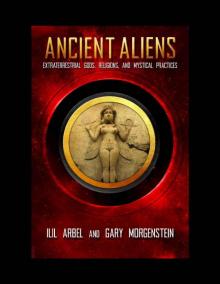 Ancient Aliens_Marradians and Anunnaki_Volume Two_Extraterrestrial Gods, Religions, and Mystical Practices
Ancient Aliens_Marradians and Anunnaki_Volume Two_Extraterrestrial Gods, Religions, and Mystical Practices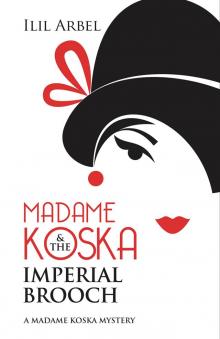 Madame Koska & the Imperial Brooch
Madame Koska & the Imperial Brooch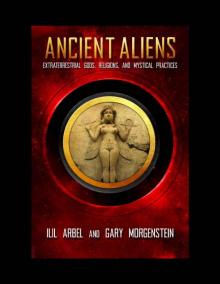 Ancient Aliens: Marradians and Anunnaki: Volume Two: Extraterrestrial Gods, Religions, and Mystical Practices
Ancient Aliens: Marradians and Anunnaki: Volume Two: Extraterrestrial Gods, Religions, and Mystical Practices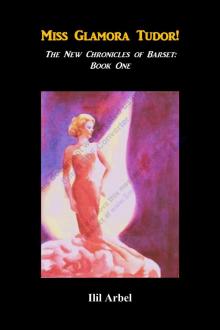 Miss Glamora Tudor!: The New Chronicles of Barset: Book One
Miss Glamora Tudor!: The New Chronicles of Barset: Book One The Cinnabar Box (Guardians of the Earth)
The Cinnabar Box (Guardians of the Earth)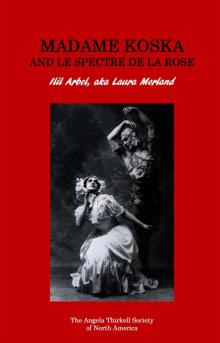 Madame Koska and Le Spectre de la Rose
Madame Koska and Le Spectre de la Rose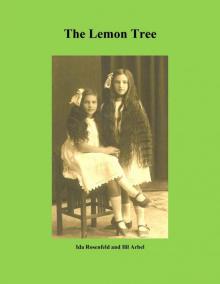 The Lemon Tree
The Lemon Tree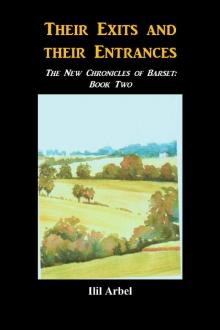 Their Exits and their Entrances: The New Chronicles of Barset: Book Two
Their Exits and their Entrances: The New Chronicles of Barset: Book Two